里根柏林墙英文演讲稿
【最新推荐】里根在诺曼底登陆40周年集会上英语演讲稿-范文模板 (5页)
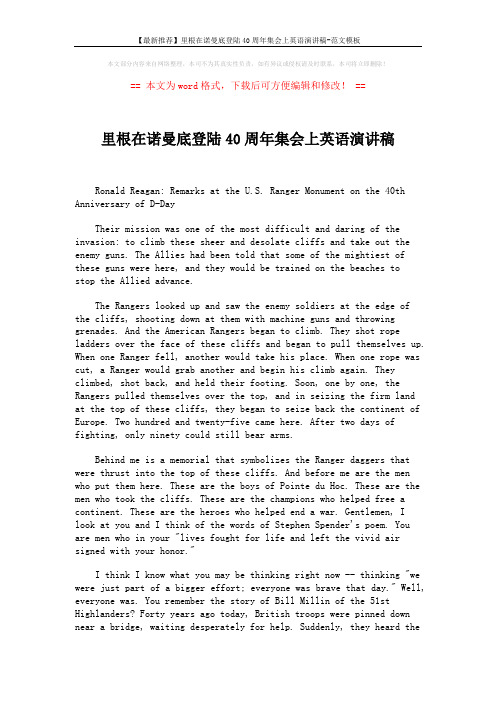
本文部分内容来自网络整理,本司不为其真实性负责,如有异议或侵权请及时联系,本司将立即删除!== 本文为word格式,下载后可方便编辑和修改! == 里根在诺曼底登陆40周年集会上英语演讲稿Ronald Reagan: Remarks at the U.S. Ranger Monument on the 40th Anniversary of D-DayTheir mission was one of the most difficult and daring of the invasion: to climb these sheer and desolate cliffs and take out the enemy guns. The Allies had been told that some of the mightiest of these guns were here, and they would be trained on the beaches tostop the Allied advance.The Rangers looked up and saw the enemy soldiers at the edge of the cliffs, shooting down at them with machine guns and throwing grenades. And the American Rangers began to climb. They shot rope ladders over the face of these cliffs and began to pull themselves up. When one Ranger fell, another would take his place. When one rope was cut, a Ranger would grab another and begin his climb again. They climbed, shot back, and held their footing. Soon, one by one, the Rangers pulled themselves over the top, and in seizing the firm landat the top of these cliffs, they began to seize back the continent of Europe. Two hundred and twenty-five came here. After two days of fighting, only ninety could still bear arms.Behind me is a memorial that symbolizes the Ranger daggers that were thrust into the top of these cliffs. And before me are the men who put them here. These are the boys of Pointe du Hoc. These are the men who took the cliffs. These are the champions who helped free a continent. These are the heroes who helped end a war. Gentlemen, I look at you and I think of the words of Stephen Spender's poem. You are men who in your "lives fought for life and left the vivid air signed with your honor."I think I know what you may be thinking right now -- thinking "we were just part of a bigger effort; everyone was brave that day." Well, everyone was. You remember the story of Bill Millin of the 51st Highlanders? Forty years ago today, British troops were pinned down near a bridge, waiting desperately for help. Suddenly, they heard thesound of bagpipes, and some thought they were dreaming. Well, they weren't. They looked up and saw Bill Millin with his bagpipes,leading the reinforcements and ignoring the smack of the bullets into the ground around him.Lord Lovat was with him -- Lord Lovat of Scotland, who calmly announced when he got to the bridge, "Sorry, I'm a few minutes late," as if he'd been delayed by a traffic jam, when in truth he'd just come from the bloody fighting on Sword Beach, which he and his menhad just taken.There was the impossible valor of the Poles, who threw themselves between the enemy and the rest of Europe as the invasion took hold; and the unsurpassed courage of the Canadians who had already seen the horrors of war on this coast. They knew what awaited them there, but they would not be deterred. And once they hit Juno Beach, they never looked back.All of these men were part of a roll call of honor with namesthat spoke of a pride as bright as the colors they bore; The Royal Winnipeg Rifles, Poland's 24th Lancers, the Royal Scots Fusiliers,the Screaming Eagles, the Yeomen of England's armored divisions, the forces of Free France, the Coast Guard's "Matchbox Fleet," and you, the American Rangers.Forty summers have passed since the battle that you fought here. You were young the day you took these cliffs; some of you were hardly more than boys, with the deepest joys of life before you. Yet, you risked everything here. Why? Why did you do it? What impelled you to put aside the instinct for self-preservation and risk your lives to take these cliffs? What inspired all the men of the armies that met here? We look at you, and somehow we know the answer. It was faithand belief. It was loyalty and love.The men of Normandy had faith that what they were doing was right, faith that they fought for all humanity, faith that a just God would grant them mercy on this beachhead, or on the next. It was the deep knowledge -- and pray God we have not lost it -- that there is a profound moral difference between the use of force for liberation and the use of force for conquest. You were here to liberate, not to conquer, and so you and those others did not doubt your cause. Andyou were right not to doubt.You all knew that some things are worth dying for. One's countryis worth dying for, and democracy is worth dying for, because it's。
里根在诺曼底登陆40周年集会上英语演讲稿
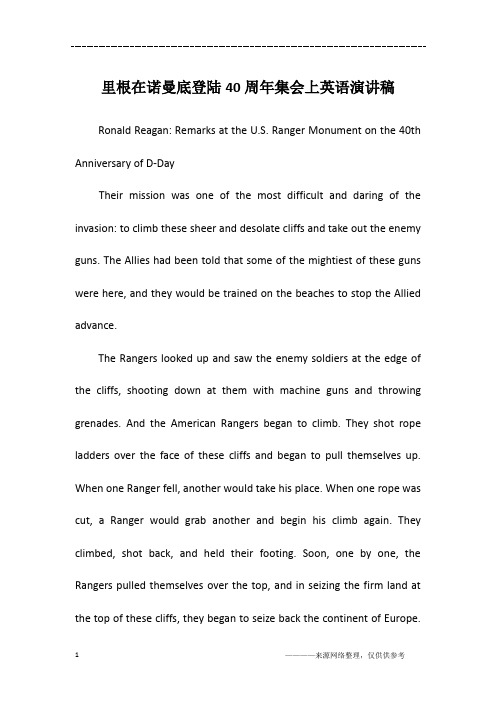
里根在诺曼底登陆40周年集会上英语演讲稿Ronald Reagan: Remarks at the U.S. Ranger Monument on the 40th Anniversary of D-DayTheir mission was one of the most difficult and daring of the invasion: to climb these sheer and desolate cliffs and take out the enemy guns. The Allies had been told that some of the mightiest of these guns were here, and they would be trained on the beaches to stop the Allied advance.The Rangers looked up and saw the enemy soldiers at the edge of the cliffs, shooting down at them with machine guns and throwing grenades. And the American Rangers began to climb. They shot rope ladders over the face of these cliffs and began to pull themselves up. When one Ranger fell, another would take his place. When one rope was cut, a Ranger would grab another and begin his climb again. They climbed, shot back, and held their footing. Soon, one by one, the Rangers pulled themselves over the top, and in seizing the firm land at the top of these cliffs, they began to seize back the continent of Europe.Two hundred and twenty-five came here. After two days of fighting, only ninety could still bear arms.Behind me is a memorial that symbolizes the Ranger daggers that were thrust into the top of these cliffs. And before me are the men who put them here. These are the boys of Pointe du Hoc. These are the men who took the cliffs. These are the champions who helped free a continent. These are the heroes who helped end a war. Gentlemen, I look at you and I think of the words of Stephen Spender's poem. You are men who in your "lives fought for life and left the vivid air signed with your honor."I think I know what you may be thinking right now -- thinking "we were just part of a bigger effort; everyone was brave that day." Well, everyone was. You remember the story of Bill Millin of the 51st Highlanders? Forty years ago today, British troops were pinned down near a bridge, waiting desperately for help. Suddenly, they heard the sound of bagpipes, and some thought they were dreaming. Well, they weren't. They looked up and saw Bill Millin with his bagpipes, leading the reinforcements and ignoring the smack of the bullets into the groundaround him.Lord Lovat was with him --Lord Lovat of Scotland, who calmly announced when he got to the bridge, "Sorry, I'm a few minutes late," as if he'd been delayed by a traffic jam, when in truth he'd just come from the bloody fighting on Sword Beach, which he and his men had just taken.There was the impossible valor of the Poles, who threw themselves between the enemy and the rest of Europe as the invasion took hold; and the unsurpassed courage of the Canadians who had already seen the horrors of war on this coast. They knew what awaited them there, but they would not be deterred. And once they hit Juno Beach, they never looked back.All of these men were part of a roll call of honor with names that spoke of a pride as bright as the colors they bore; The Royal Winnipeg Rifles, Poland's 24th Lancers, the Royal Scots Fusiliers, the Screaming Eagles, the Yeomen of England's armored divisions, the forces of Free France, the Coast Guard's "Matchbox Fleet," and you, the American Rangers.Forty summers have passed since the battle that you fought here. You were young the day you took these cliffs; some of you were hardly more than boys, with the deepest joys of life before you. Yet, you risked everything here. Why? Why did you do it? What impelled you to put aside the instinct for self-preservation and risk your lives to take these cliffs? What inspired all the men of the armies that met here? We look at you, and somehow we know the answer. It was faith and belief. It was loyalty and love.The men of Normandy had faith that what they were doing was right, faith that they fought for all humanity, faith that a just God would grant them mercy on this beachhead, or on the next. It was the deep knowledge -- and pray God we have not lost it -- that there is a profound moral difference between the use of force for liberation and the use of force for conquest. You were here to liberate, not to conquer, and so you and those others did not doubt your cause. And you were right not to doubt.You all knew that some things are worth dying for. One's country is worth dying for, and democracy is worth dying for, because it's the mostdeeply honorable form of government ever devised by man. All of you loved liberty. All of you were willing to fight tyranny, and you knew the people of your countries were behind you.The Americans who fought here that morning knew word of the invasion was spreading through the darkness back home. They fought --or felt in their hearts, though they couldn't know in fact, that in Georgia they were filling the churches at 4:00 am. In Kansas they were kneeling on their porches and praying, and in Philadelphia they were ringing the Liberty Bell.Something else helped the men of D-day; their rock-hard belief that Providence would have a great hand in the events that would unfold here; that God was an ally in this great cause. And so, the night before the invasion, when Colonel Wolverton asked his parachute troops to kneel with him in prayer, he told them: "Do not bow your heads, but look up so you can see God and ask His blessing in what we're about to do." Also, that night, General Matthew Ridgway on his cot, listening in the darkness for the promise God made to Joshua: "I will not fail thee nor forsake thee."These are the things that impelled them; these are the things that shaped the unity of the Allies.When the war was over, there were lives to be rebuilt and governments to be returned to the people. There were nations to be reborn. Above all, there was a new peace to be assured. These were huge and daunting tasks. But the Allies summoned strength from the faith, belief, loyalty, and love of those who fell here. They rebuilt a new Europe together. There was first a great reconciliation among those who had been enemies, all of whom had suffered so greatly. The United States did its part, creating the Marshall Plan to help rebuild our allies and our former enemies. The Marshall Plan led to the Atlantic alliance --a great alliance that serves to this day as our shield for freedom, for prosperity, and for peace.In spite of our great efforts and successes, not all that followed the end of the war was happy or planned. Some liberated countries were lost. The great sadness of this loss echoes down to our own time in the streets of Warsaw, Prague, and East Berlin. The Soviet troops that came to the center of this continent did not leave when peace came. They'restill there, uninvited, unwanted, unyielding, almost forty years after the war. Because of this, allied forces still stand on this continent. Today, as forty years ago, our armies are here for only one purpose: to protect and defend democracy. The only territories we hold are memorials like this one and graveyards where our heroes rest.We in America have learned bitter lessons from two world wars. It is better to be here ready to protect the peace, than to take blind shelter across the sea, rushing to respond only after freedom is lost. We've learned that isolationism never was and never will be an acceptable response to tyrannical governments with an expansionist intent. But we try always to be prepared for peace, prepared to deter aggression, prepared to negotiate the reduction of arms, and yes, prepared to reach out again in the spirit of reconciliation. In truth, there is no reconciliation we would welcome more than a reconciliation with the Soviet Union, so, together, we can lessen the risks of war, now and forever.It's fitting to remember here the great losses also suffered by the Russian people during World War II: 20 million perished, a terrible price that testifies to all the world the necessity of ending war. I tell you frommy heart that we in the United States do not want war. We want to wipe from the face of the earth the terrible weapons that man now has in his hands. And I tell you, we are ready to seize that beachhead. We look for some sign from the Soviet Union that they are willing to move forward, that they share our desire and love for peace, and that they will give up the ways of conquest. There must be a changing there that will allow us to turn our hope into action.We will pray forever that someday that changing will come. But for now, particularly today, it is good and fitting to renew our commitment to each other, to our freedom, and to the alliance that protects it.We're bound today by what bound us 40 years ago, the same loyalties, traditions, and beliefs. We're bound by reality. The strength of America's allies is vital to the United States, and the American security guarantee is essential to the continued freedom of Europe's democracies. We were with you then; we are with you now. Your hopes are our hopes, and your destiny is our destiny.Here, in this place where the West held together, let us make a vow to our dead. Let us show them by our actions that we understand whatthey died for. Let our actions say to them the words for which Matthew Ridgway listened: "I will not fail thee nor forsake thee."Strengthened by their courage and heartened by their valor and borne by their memory, let us continue to stand for the ideals for which they lived and died.Thank you very much, and God bless you all.。
里根总统就职演说 英语
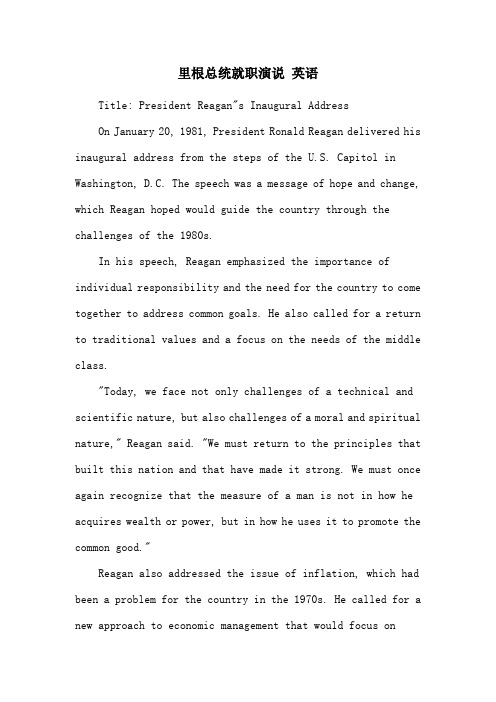
里根总统就职演说英语Title: President Reagan"s Inaugural AddressOn January 20, 1981, President Ronald Reagan delivered his inaugural address from the steps of the U.S. Capitol in Washington, D.C. The speech was a message of hope and change, which Reagan hoped would guide the country through the challenges of the 1980s.In his speech, Reagan emphasized the importance of individual responsibility and the need for the country to come together to address common goals. He also called for a return to traditional values and a focus on the needs of the middle class."Today, we face not only challenges of a technical and scientific nature, but also challenges of a moral and spiritual nature," Reagan said. "We must return to the principles that built this nation and that have made it strong. We must once again recognize that the measure of a man is not in how he acquires wealth or power, but in how he uses it to promote the common good."Reagan also addressed the issue of inflation, which had been a problem for the country in the 1970s. He called for a new approach to economic management that would focus oncontrolling spending and increasing production. He also proposed a tax cut to help stimulate the economy and reduce inflation.Overall, Reagan"s inaugural address was a message of hope and change, which reflected his vision for the country in the 1980s. It was a departure from the more moderate tone of his opponent, Walter Mondale, who had won the election the previous November. Reagan"s speech would go on to be remembered as one of the most powerful and influential in American history.拓展:Reagan"s inaugural address was a departure from the more moderate tone of his opponent, Walter Mondale, who had won the election the previous November. Reagan"s speech reflected his vision for the country in the 1980s, which was marked by economic growth, reduced government interference in the economy, and a return to traditional values. Reagan"s inaugural address was also notable for its emphasis on individual responsibility and the need for the country to come together to address common goals.During his presidency, Reagan would implement policies that were aimed at reducing inflation and increasing economic growth. He also proposed cuts to government spending andincreased taxes on the wealthy, which helped to finance his policies and promote economic growth. Reagan"s policies would be successful in reducing inflation and increasing economic growth, and they would also be remembered for their impact on American society.Overall, Reagan"s inaugural address was a message of hope and change, which reflected his vision for the country in the 1980s. It was a departure from the more moderate tone of his opponent, Walter Mondale, and it would go on to be remembered as one of the most powerful and influential in American history.。
里根就职演讲名言
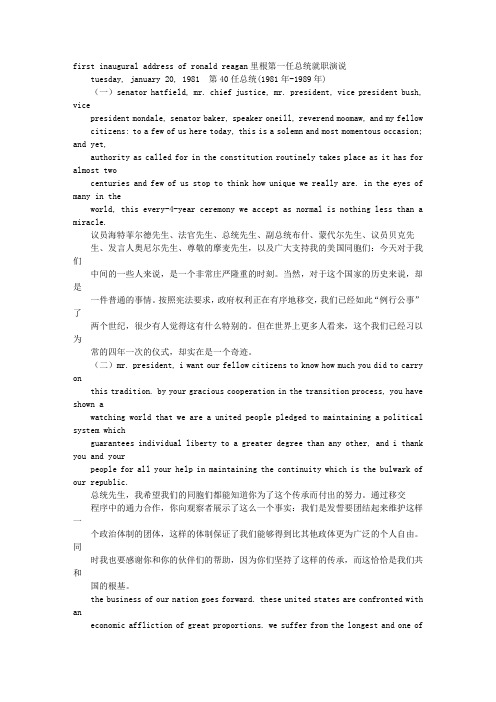
first inaugural address of ronald reagan里根第一任总统就职演说tuesday, january 20, 1981 第40任总统(1981年-1989年) (一)senator hatfield, mr. chief justice, mr. president, vice president bush,vicepresident mondale, senator baker, speaker oneill, reverend moomaw, and my fellow citizens: to a few of us here today, this is a solemn and most momentous occasion;and yet,authority as called for in the constitution routinely takes place as it has foralmost twocenturies and few of us stop to think how unique we really are. in the eyes ofmany in theworld, this every-4-year ceremony we accept as normal is nothing less than amiracle.议员海特菲尔德先生、法官先生、总统先生、副总统布什、蒙代尔先生、议员贝克先生、发言人奥尼尔先生、尊敬的摩麦先生,以及广大支持我的美国同胞们:今天对于我们中间的一些人来说,是一个非常庄严隆重的时刻。
当然,对于这个国家的历史来说,却是一件普通的事情。
按照宪法要求,政府权利正在有序地移交,我们已经如此“例行公事”了两个世纪,很少有人觉得这有什么特别的。
但在世界上更多人看来,这个我们已经习以为常的四年一次的仪式,却实在是一个奇迹。
里根在复旦的演讲稿英汉对照版全
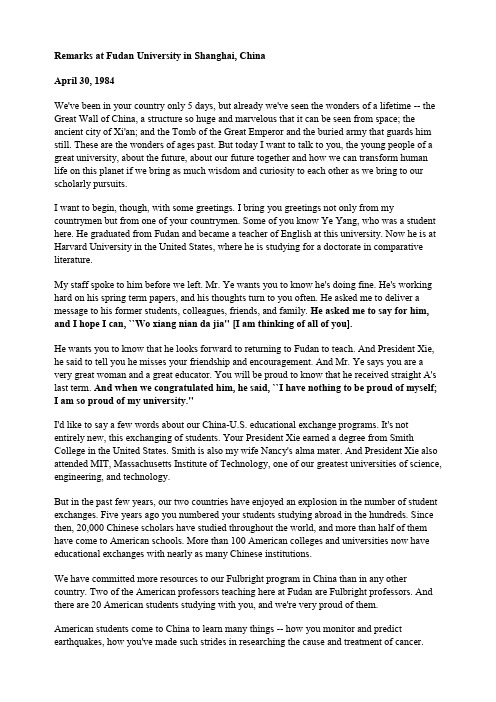
Remarks at Fudan University in Shanghai, ChinaApril 30, 1984We've been in your country only 5 days, but already we've seen the wonders of a lifetime -- the Great Wall of China, a structure so huge and marvelous that it can be seen from space; the ancient city of Xi'an; and the Tomb of the Great Emperor and the buried army that guards him still. These are the wonders of ages past. But today I want to talk to you, the young people of a great university, about the future, about our future together and how we can transform human life on this planet if we bring as much wisdom and curiosity to each other as we bring to our scholarly pursuits.I want to begin, though, with some greetings. I bring you greetings not only from my countrymen but from one of your countrymen. Some of you know Ye Yang, who was a student here. He graduated from Fudan and became a teacher of English at this university. Now he is at Harvard University in the United States, where he is studying for a doctorate in comparative literature.My staff spoke to him before we left. Mr. Ye wants you to know he's doing fine. He's working hard on his spring term papers, and his thoughts turn to you often. He asked me to deliver a message to his former students, colleagues, friends, and family. He asked me to say for him, and I hope I can, ``Wo xiang nian da jia'' [I am thinking of all of you].He wants you to know that he looks forward to returning to Fudan to teach. And President Xie, he said to tell you he misses your friendship and encouragement. And Mr. Ye says you are a very great woman and a great educator. You will be proud to know that he received straight A's last term. And when we congratulated him, he said, ``I have nothing to be proud of myself;I am so proud of my university.''I'd like to say a few words about our China-U.S. educational exchange programs. It's not entirely new, this exchanging of students. Your President Xie earned a degree from Smith College in the United States. Smith is also my wife Nancy's alma mater. And President Xie also attended MIT, Massachusetts Institute of Technology, one of our greatest universities of science, engineering, and technology.But in the past few years, our two countries have enjoyed an explosion in the number of student exchanges. Five years ago you numbered your students studying abroad in the hundreds. Since then, 20,000 Chinese scholars have studied throughout the world, and more than half of them have come to American schools. More than 100 American colleges and universities now have educational exchanges with nearly as many Chinese institutions.We have committed more resources to our Fulbright program in China than in any other country. Two of the American professors teaching here at Fudan are Fulbright professors. And there are 20 American students studying with you, and we're very proud of them.American students come to China to learn many things -- how you monitor and predict earthquakes, how you've made such strides in researching the cause and treatment of cancer.We have much to learn from you in neurosurgery and in your use of herbs in medicine. And we welcome the chance to study your language, your history, and your society.You, in turn, have shown that you're eager to learn, to come to American schools and study electronics and computer sciences, math and engineering, physics, management, and the humanities. We have much to share in these fields, and we're eager to benefit from your curiosity. Much of this sharing is recent, only 5 years old. But the areas of our mutual cooperation continue to expand. We've already agreed to cooperate more closely in trade, technology, investment, and exchanges of scientific and managerial expertise. And we have just concluded an important agreement to help advance our technological and economic development through the peaceful use of nuclear energy.That term ``peaceful use of nuclear energy'' is key. Our agreement rests upon important principles of nonproliferation. Neither of our countries will encourage nuclear proliferation nor assist any other country to acquire or develop any nuclear explosive device.We live in a troubled world, and the United States and China, as two great nations, share a special responsibility to help reduce the risks of war. We both agree that there can be only one sane policy to preserve our precious civilization in this modern age: A nuclear war cannot be won and must never be fought. And no matter how great the obstacles may seem, we must never stop our efforts to reduce the weapons of war. We must never stop at all until we see the day when nuclear arms have been banished from the face of this Earth.With peaceful cooperation as our guide, the possibilities for future progress are great. For example, we look forward to exploring with China the possibilities of cooperating in the development of space on behalf of our fellow citizens.Our astronauts have found that by working in the zero gravity environment of space, we will be able to manufacture life-saving medicines with far greater purity and efficiency, medicines that will treat diseases of heart attack and stroke that afflict millions of us. We will learn how to manufacture Factor 8, a rare and expensive medicine used to treat hemophiliacs. We can research the Beta Cell, which produces insulin, and which could provide mankind's first permanent cure for diabetes.New satellites can be launched for use in navigation, weather forecasting, broadcasting, and computer technology. We already have the technology to make the extraordinary commonplace. We hope to see the day when a Chinese scientist working out an engineering problem in Fudan will be able to hook into the help of a scientist at a computer at MIT. And the scientist in Boston will be able to call on the expertise of the scientist in Shanghai, and all of it in a matter of seconds.My young friends, this is the way of the future. By pooling our talents and resources, we can make space a new frontier of peace.Your government's policy of forging closer ties in the free exchange of knowledge has not only enlivened your economy, it has opened the way to a new convergence of Chinese and American interests. You have opened the door, and let me assure you that ours is also open.Now, all of this is particularly exciting in light of the recent history of our two countries. For many years, there was no closeness between us. The silence took its toll. A dozen years ago, it began to change. Together, we made it change. And now in the past 5 years, your policy of opening to the outside world has helped us begin to know each other better than we ever had before.But that process has just begun. To many Americans, China is still a faraway place, unknown, unseen, and fascinating. And we are fascinated. [Laughter]I wonder if you're aware of the many ways China has touched American life? The signs of your influence and success abound. If I were spending this afternoon in Washington, I might look out the window and see a man and woman strolling along Pennsylvania Avenue wearing Chinese silk. They might be on their way to our National Portrait Gallery to see the Chinese art exhibit. And from there, perhaps they would stroll to our National Gallery to see the new building designed by the Chinese American architect, I.M. Pei. After that, they might end their day dining in a restaurant that serves Chinese cuisine. [Laughter]We associate China with vitality, enormous vitality, and something that doesn't always go along with that -- subtlety, the subtlety of discerning and intelligent minds.Premier Zhao saw something of the American attitude toward China when he visited us in January. He said after a few days in our country that he never expected such profound feelings of friendship among the American people for the Chinese people.Well, let me say, I'm happy to return the compliment. I have found the people of China to be just as warm and friendly toward us, and it's made us very glad.But meeting you and talking to you has only made me want to know more. And I sense that you feel the same way about Americans. You, too, wish to know more.I would like to tell you something about us, and also share something of my own values.First of all, America is really many Americas. We call ourselves a nation of immigrants, and that's truly what we are. We have drawn people from every corner of the Earth. We're composed of virtually every race and religion, and not in small numbers, but large. We have a statue in New York Harbor that speaks of this, a statue of a woman holding a torch of welcome to those who enter our country to become Americans. She has greeted millions upon millions of immigrants to our country. She welcomes them still. She represents our open door.All of the immigrants who came to us brought their own music, literature, customs, and ideas. And the marvelous thing, a thing of which we're proud, is they did not have to relinquish these things in order to fit in. In fact, what they brought to America became American. And this diversity has more than enriched us; it has literally shaped us.This tradition -- the tradition of new immigrants adding to the sum total of what we are -- is not a thing of the past. New immigrants are still bringing their talents and improving the quality of American life. Let me name a few -- I think you'll know their names.In America, Wang computers have become a fixture in offices throughout the country. They are the product of the energy and brilliance of Mr. An Wang, who himself is the product of a Shanghai university.The faces of our cities shine with the gleaming buildings of Mr. I.M. Pei, who first became interested in architecture as a student here in Shanghai.What we know of the universe and the fundamental nature of matter has been expanded by t he Nobel Prize winning scientist, Dr. Lee Tsung-Dao, who was born in Shanghai.We admire these men; we honor them; and we salute you for what you gave them that helped make them great.Sometimes in America, some of our people may disagree with each other. We are often a highly disputatious nation. We rather like to argue. We are free to disagree among ourselves, and we do. But we always hold together as a society. We've held together for more than 200 years, because we're united by certain things in which we all believe, things to which we've quietly pledged our deepest loyalties. I draw your special attention to what I'm about to say, because it's so important to an understanding of my country.We believe in the dignity of each man, woman, and child. Our entire system is founded on an appreciation of the special genius of each individual, and of his special right to make his own decisions and lead his own life.We believe -- and we believe it so deeply that Americans know these words by heart -- we believe ``that all men are created equal, that they are endowed by their Creator with certain unalienable Rights, that among those are Life, Liberty and the pursuit of Happiness.'' Take an American student or teacher aside later today and ask if he or she hasn't committed those words to memory. They are from the document by which we created our nation, the Declaration of Independence.We elect our government by the vote of the people. That is how we choose our Congress and our President. We say of our country, ``Here the People Rule,'' and it is so.Let me tell you something of the American character. You might think that with such a varied nation there couldn't be one character, but in many fundamental ways there is.We are a fair-minded people. We're taught not to take what belongs to others. Many of us, as I said, are the children and grandchildren and great-grandchildren of immigrants, and from them we learned something of hard labor. As a nation we toiled up from poverty, and no people on Earth are more worthy to be trusted than those who have worked hard for what they have. None is less inclined to take what is not theirs.We're idealists. Americans love freedom, and we've fought and died to protect the freedom of others. When the armies of fascism swept Europe four decades ago, the American people fought at great cost to defend the countries under assault.When the armies of fascism swept Asia, we fought with you to stop them. And some of you listening today remember those days, remember when our General Jimmy Doolittle and his squadron came halfway around the world to help. Some of those pilots landed in China. You remember those brave young men. You hid them and cared for them and bound up their wounds. You saved many of their lives.When the Second World War was won, the United States voluntarily withdrew from the faraway places in which we had fought. We kept no permanent armies of occupation. We didn't take an inch of territory, nor do we occupy one today. Our record of respect for the freedom and independence of others is clear.We're a compassionate people. When the war ended we helped rebuild our allies -- and our enemies as well. We did this because we wanted to help the innocent victims of bad governments and bad policies, and because, if they prospered, peace would be more secure.We're an optimistic people. Like you, we inherited a vast land of endless skies, tall mountains, rich fields, and open prairies. It made us see the possibilities in everything. It made us hopeful. And we devised an economic system that rewarded individual effort, that gave us good reason for hope.We love peace. We hate war. We think -- and always have -- that war is a great sin, a woeful waste. We wish to be at peace with our neighbors. We want to live in harmony with friends.There is one other part of our national character I wish to speak of. Religion and faith are very important to us. We're a nation of many religions. But most Americans derive their religious belief from the Bible of Moses, who delivered a people from slavery; the Bible of Jesus Christ, who told us to love thy neighbor as thyself, to do unto your neighbor as you would have him do unto you.And this, too, has formed us. It's why we wish well for others. It's why it grieves us when we hear of people who cannot live up to their full potential and who cannot live in peace.We invite you to know us. That is the beginning of friendship between people. And friendship between people is the basis for friendship between governments.The silence between our governments has ended. In the past 12 years, our people have become reacquainted, and now our relationship is maturing. And we're at the point where we can build the basis for a lasting friendship.Now, you know, as I do, that there's much that naturally divides us: time and space, different languages and values, different cultures and histories, and political systems that are fundamentally different. It would be foolish not to acknowledge these differences. There's no point in hiding the truth for the sake of a friendship, for a friendship based on fiction will not long withstand the rigors of this world.But let us, for a moment, put aside the words that name our differences and think what we have in common. We are two great and huge nations on opposite sides of the globe. We are bothcountries of great vitality and strength. You are the most populous country on Earth; we are the most technologically developed. Each of us holds a special weight in our respective sides of the world.There exists between us a kind of equipoise. Those of you who are engineering students will perhaps appreciate that term. It speaks of a fine and special balance.Already there are some political concerns that align us, and there are some important questions on which we both agree. Both the United States and China oppose the brutal and illegal occupation of Kampuchea. Both the United States and China have stood together in condemning the evil and unlawful invasion of Afghanistan. Both the United States and China now share a stake in preserving peace on the Korean Peninsula, and we share a stake in preserving peace in this area of the world.Neither of us is an expansionist power. We do not desire your land, nor you ours. We do not challenge your borders. We do not provoke your anxieties. In fact, both the United States and China are forced to arm themselves against those who do.The United States is now undertaking a major strengthening of our defenses. It's an expensive effort, but we make it to protect the peace, knowing that a strong America is a safeguard for the independece and peace of others.Both the United States and China are rich in human resources and human talent. What wonders lie before us if we practice the advice, Tong Li He Zuo -- Connect strength, and work together.Over the past 12 years, American and Chinese leaders have met frequently to discuss a host of issues. Often we have found agreement, but even when we have not, we've gained insight into each other, and we've learned to appreciate the other's perspectives on the world.This process will continue, and it will flourish if we remember certain things. We must neither ignore our problems nor overstate them. We must never exaggerate our difficulties or send alarms for small reasons. We must remember that it is a delicate thing to oppose the wishes of a friend, and when we're forced to do so, we must be understanding with each other.I hope that when history looks back upon this new chapter in our relationship, these will be remembered as days when America and China accepted the challenge to strengthen the ties that bind us, to cooperate for greater prosperity among our people, and to strive for a more secure and just peace in the world.You, the students at Fudan University, and the scholars at all the universities in China and America have a great role to play in both our countries' futures. From your ranks will come the understanding and skill the world will require in decades to come. Today's leaders can pave the way of the future. That is our responsibility. But it is always the younger generation who will make the future. It is you who will decide if a continuing, personal friendship can span the generations and the differences that divide us. In such friendship lies the hope of the world.When he was a very young man, Zhou Enlai wrote a poem for a schoolmate who was leaving to study abroad. Zhou appreciated the responsibilities that separated them, but he also remembered fondly the qualities that made them friends. And his poem ends:Promise, I pray, that somedayWhen task done, we go back farming,We'll surely rent a plot of groundAnd as pairing neighbors, let's live.Well, let us, as pairing neighbors, live.I've been happy to speak to you here, to meet you in this city that is so rich in significance for both our countries. Shanghai is a city of scholarship, a city of learning. Shanghai has been a window to the West. It is a city in which my country and yours issued the communique that began our modern friendship. It is the city where the Yangtze meets the East China Sea, which, itself, becomes the Pacific, which touches our shores.The Yangtze is a swift and turbulent river, one of the great rivers of the world. My young friends, history is a river that may take us as it will. But we have the power to navigate, to choose direction, and make our passage together. The wind is up, the current is swift, and opportunity for a long and fruitful journey awaits us.Generations hence will honor us for having begun the voyage, for moving on together and escaping the fate of the buried armies of Xi'an, the buried warriors who stood for centuries frozen in time, frozen in an unknowing enmity.We have made our choice. Our new journey will continue. And may it always continue in peace and in friendship. Thank you very much.Note: The President spoke at 3:40 p.m. in the auditorium at the university.里根在复旦的演讲稿汉语版里根在复旦大学的演讲(摘要)—————————Monday, April 30, 1984 —————————我们访问中国才五天,所看到的名胜古迹却使我们一生难忘。
罗纳德·里根英文美文整理
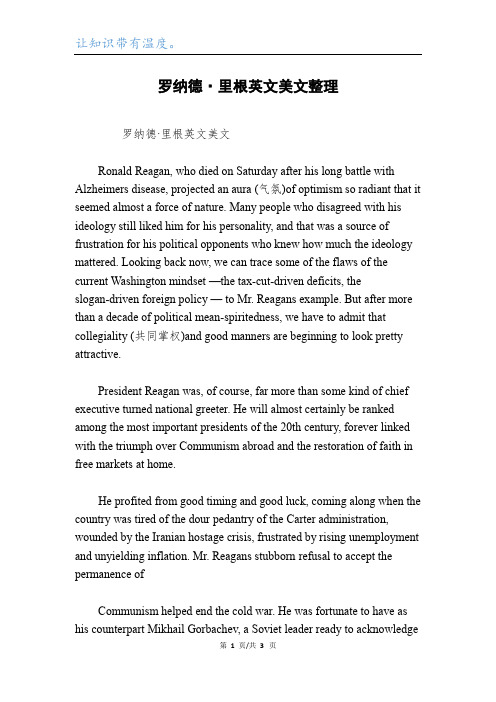
让知识带有温度。
罗纳德·里根英文美文整理罗纳德·里根英文美文Ronald Reagan, who died on Saturday after his long battle with Alzheimers disease, projected an aura (气氛)of optimism so radiant that it seemed almost a force of nature. Many people who disagreed with his ideology still liked him for his personality, and that was a source of frustration for his political opponents who knew how much the ideology mattered. Looking back now, we can trace some of the flaws of the current Washington mindset —the tax-cut-driven deficits, theslogan-driven foreign policy — to Mr. Reagans example. But after more than a decade of political mean-spiritedness, we have to admit that collegiality (共同掌权)and good manners are beginning to look pretty attractive.President Reagan was, of course, far more than some kind of chief executive turned national greeter. He will almost certainly be ranked among the most important presidents of the 20th century, forever linked with the triumph over Communism abroad and the restoration of faith in free markets at home.He profited from good timing and good luck, coming along when the country was tired of the dour pedantry of the Carter administration, wounded by the Iranian hostage crisis, frustrated by rising unemployment and unyielding inflation. Mr. Reagans stubborn refusal to accept the permanence ofCommunism helped end the cold war. He was fortunate to have as his counterpart Mikhail Gorbachev, a Soviet leader ready to acknowledge第1页/共3页千里之行,始于足下。
里根演讲稿
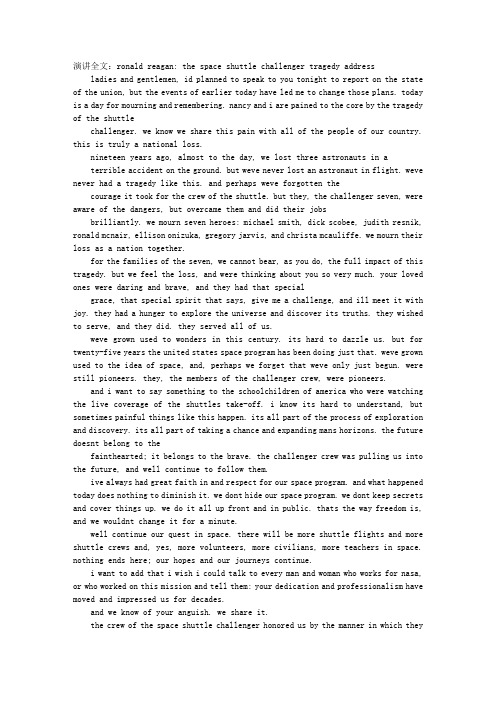
演讲全文:ronald reagan: the space shuttle challenger tragedy address ladies and gentlemen, id planned to speak to you tonight to report on the stateof the union, but the events of earlier today have led me to change those plans. todayis a day for mourning and remembering. nancy and i are pained to the core by the tragedyof the shuttlechallenger. we know we share this pain with all of the people of our country.this is truly a national loss. nineteen years ago, almost to the day, we lost three astronauts in a terrible accident on the ground. but weve never lost an astronaut in flight. wevenever had a tragedy like this. and perhaps weve forgotten the courage it took for the crew of the shuttle. but they, the challenger seven, wereaware of the dangers, but overcame them and did their jobs brilliantly. we mourn seven heroes: michael smith, dick scobee, judith resnik,ronald mcnair, ellison onizuka, gregory jarvis, and christa mcauliffe. we mourn theirloss as a nation together. for the families of the seven, we cannot bear, as you do, the full impact of thistragedy. but we feel the loss, and were thinking about you so very much. your lovedones were daring and brave, and they had that special grace, that special spirit that says, give me a challenge, and ill meet it withjoy. they had a hunger to explore the universe and discover its truths. they wishedto serve, and they did. they served all of us. weve grown used to wonders in this century. its hard to dazzle us. but fortwenty-five years the united states space program has been doing just that. weve grownused to the idea of space, and, perhaps we forget that weve only just begun. werestill pioneers. they, the members of the challenger crew, were pioneers. and i want to say something to the schoolchildren of america who were watchingthe live coverage of the shuttles take-off. i know its hard to understand, butsometimes painful things like this happen. its all part of the process of explorationand discovery. its all part of taking a chance and expanding mans horizons. the futuredoesnt belong to thefainthearted; it belongs to the brave. the challenger crew was pulling us intothe future, and well continue to follow them. ive always had great faith in and respect for our space program. and what happenedtoday does nothing to diminish it. we dont hide our space program. we dont keep secretsand cover things up. we do it all up front and in public. thats the way freedom is,and we wouldnt change it for a minute. well continue our quest in space. there will be more shuttle flights and moreshuttle crews and, yes, more volunteers, more civilians, more teachers in space.nothing ends here; our hopes and our journeys continue.i want to add that i wish i could talk to every man and woman who works for nasa,or who worked on this mission and tell them: your dedication and professionalism havemoved and impressed us for decades. and we know of your anguish. we share it. the crew of the space shuttle challenger honored us by the manner in which theylived their lives. we will never forget them, nor the last time we saw them, thismorning, as they prepared for their journey and waved goodbye and slipped the surlybonds of earth to touch the face of god. thank you.篇二:1981年里根就职演讲稿-中英文对照first inaugural address of ronald reagan里根第一任总统就职演说tuesday, january 20, 1981 第40任总统(1981年-1989年) (一)senator hatfield, mr. chief justice, mr. president, vice president bush,vicepresident mondale, senator baker, speaker oneill, reverend moomaw, and my fellow citizens: to a few of us here today, this is a solemn and most momentous occasion;and yet,authority as called for in the constitution routinely takes place as it has foralmost twocenturies and few of us stop to think how unique we really are. in the eyes ofmany in theworld, this every-4-year ceremony we accept as normal is nothing less than amiracle.议员海特菲尔德先生、法官先生、总统先生、副总统布什、蒙代尔先生、议员贝克先生、发言人奥尼尔先生、尊敬的摩麦先生,以及广大支持我的美国同胞们:今天对于我们中间的一些人来说,是一个非常庄严隆重的时刻。
里根总统的就职演讲 英文版
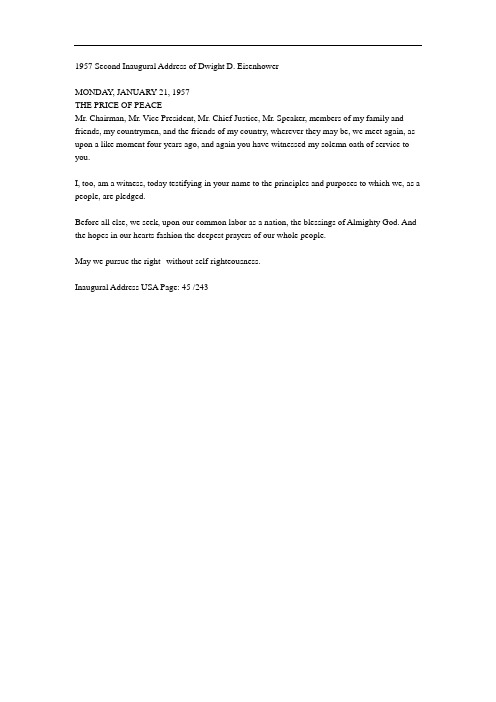
1957 Second Inaugural Address of Dwight D. EisenhowerMONDAY, JANUARY 21, 1957THE PRICE OF PEACEMr. Chairman, Mr. Vice President, Mr. Chief Justice, Mr. Speaker, members of my family and friends, my countrymen, and the friends of my country, wherever they may be, we meet again, as upon a like moment four years ago, and again you have witnessed my solemn oath of service to you.I, too, am a witness, today testifying in your name to the principles and purposes to which we, as a people, are pledged.Before all else, we seek, upon our common labor as a nation, the blessings of Almighty God. And the hopes in our hearts fashion the deepest prayers of our whole people.May we pursue the right--without self-righteousness.Inaugural Address USA Page: 45 /243历届美国总统就职演说1789-2001May we know unity--without conformity.May we grow in strength--without pride in self.May we, in our dealings with all peoples of the earth, ever speak truth and serve justice.And so shall America--in the sight of all men of good will--prove true to the honorable purposes that bind and rule us as a people in all this time of trial through which we pass.We live in a land of plenty, but rarely has this earth known such peril as today.In our nation work and wealth abound. Our population grows. Commerce crowds our rivers and rails, our skies, harbors, and highways. Our soil is fertile, our agriculture productive. The air rings with the song of our industry--rolling mills and blast furnaces, dynamos, dams, and assembly lines--the chorus of America the bountiful.This is our home--yet this is not the whole of our world. For our world is where our full destiny lies--with men, of all people, and all nations, who are or would be free. And for them--and so for us--this is no time of ease or of rest.In too much of the earth there is want, discord, danger. New forces and new nations stir and strive across the earth, with power to bring, by their fate, great good or great evil to the free world's future. From the deserts of North Africa to the islands of the South Pacific one third of all mankind has entered upon an historic struggle for a new freedom; freedom from grinding poverty. Across all continents, nearly a billion people seek, sometimes almost in desperation, for the skills and knowledge and assistance by which they may satisfy from their own resources, the material wants common to all mankind.No nation, however old or great, escapes this tempest of change and turmoil. Some, impoverished by the recent World War, seek to restore their means of livelihood. In the heart of Europe, Germany still stands tragically divided. So is the whole continent divided. And so, too, is all the world.The divisive force is International Communism and the power that it controls.The designs of that power, dark in purpose, are clear in practice. It strives to seal forever the fate of those it has enslaved. It strives to break the ties that unite the free. And it strives to capture--to exploit for its own greater power--all forces of change in the world, especially the needs of the hungry and the hopes of the oppressed.Yet the world of International Communism has itself been shaken by a fierce and mighty force: the readiness of men who love freedom to pledge their lives to that love. Through the night of their bondage, the unconquerable will of heroes has struck with the swift, sharp thrust of lightning.Inaugural Address USA Page: 46 /243历届美国总统就职演说1789-2001Budapest is no longer merely the name of a city; henceforth it is a new and shining symbol of man's yearning to be free.Thus across all the globe there harshly blow the winds of change. And, we--though fortunate be our lot--know that we can never turn our backs to them.We look upon this shaken earth, and we declare our firm and fixed purpose--the building of a peace with justice in a world where moral law prevails.The building of such a peace is a bold and solemn purpose. To proclaim it is easy. To serve it will be hard. And to attain it, we must be aware of its full meaning--and ready to pay its full price.We know clearly what we seek, and why.We seek peace, knowing that peace is the climate of freedom. And now, as in no other age, we seek it because we have been warned, by the power of modern weapons, that peace may be the only climate possible for human life itself.Yet this peace we seek cannot be born of fear alone: it must be rooted in the lives of nations. There must be justice, sensed and shared by all peoples, for, without justice the world can know only a tense and unstable truce. There must be law, steadily invoked and respected by all nations, for without law, the world promises only such meager justice as the pity of the strong upon the weak. But the law of which we speak, comprehending the values of freedom, affirms the equality of all nations, great and small.Splendid as can be the blessings of such a peace, high will be its cost: in toil patiently sustained, in help honorably given, in sacrifice calmly borne.We are called to meet the price of this peace.To counter the threat of those who seek to rule by force, we must pay the costs of our own needed military strength, and help to build the security of others.We must use our skills and knowledge and, at times, our substance, to help others rise from misery,however far the scene of suffering may be from our shores. For wherever in the world a people knows desperate want, there must appear at least the spark of hope, the hope of progress--or there will surely rise at last the flames of conflict.We recognize and accept our own deep involvement in the destiny of men everywhere. We areaccordingly pledged to honor, and to strive to fortify, the authority of the United Nations. For in that body rests the best hope of our age for the assertion of that law by which all nations may live in dignity.And, beyond this general resolve, we are called to act a responsible role in the world's greatInaugural Address USA Page: 47 /243历届美国总统就职演说1789-2001concerns or conflicts--whether they touch upon the affairs of a vast region, the fate of an island in the Pacific, or the use of a canal in the Middle East. Only in respecting the hopes and cultures of others will we practice the equality of all nations. Only as we show willingness and wisdom in giving counsel--in receiving counsel--and in sharing burdens, will we wisely perform the work of peace.For one truth must rule all we think and all we do. No people can live to itself alone. The unity of all who dwell in freedom is their only sure defense. The economic need of all nations--in mutual dependence--makes isolation an impossibility; not even America's prosperity could long survive if other nations did not also prosper. No nation can longer be a fortress, lone and strong and safe. And any people, seeking such shelter for themselves, can now build only their own prison.Our pledge to these principles is constant, because we believe in their rightness.We do not fear this world of change. America is no stranger to much of its spirit. Everywhere we see the seeds of the same growth that America itself has known. The American experiment has, for generations, fired the passion and the courage of millions elsewhere seeking freedom, equality, and opportunity. And the American story of material progress has helped excite the longing of all needy peoples for some satisfaction of their human wants. These hopes that we have helped to inspire, we can help to fulfill.In this confidence, we speak plainly to all peoples.We cherish our friendship with all nations that are or would be free. We respect, no less, their independence. And when, in time of want or peril, they ask our help, they may honorably receive it; for we no more seek to buy their sovereignty than we would sell our own. Sovereignty is never bartered among freemen.We honor the aspirations of those nations which, now captive, long for freedom. We seek neither their military alliance nor any artificial imitation of our society. And they can know the warmth of the welcome that awaits them when, as must be, they join again the ranks of freedom.We honor, no less in this divided world than in a less tormented time, the people of Russia. We do not dread, rather do we welcome, their progress in education and industry. We wish them success in their demands for more intellectual freedom, greater security before their own laws, fuller enjoyment of the rewards of their own toil. For as such things come to pass, the more certain will be the coming of that day when our peoples may freely meet in friendship.So we voice our hope and our belief that we can help to heal this divided world. Thus may the nations cease to live in trembling before the menace of force. Thus may the weight of fear and theweight of arms be taken from the burdened shoulders of mankind.This, nothing less, is the labor to which we are called and our strength dedicated. Inaugural Address USA Page: 48 /243历届美国总统就职演说1789-2001And so the prayer of our people carries far beyond our own frontiers, to the wide world of our duty and our destiny.May the light of freedom, coming to all darkened lands, flame brightly--until at last the darkness is no more.May the turbulence of our age yield to a true time of peace, when men and nations shall share a life that honors the dignity of each, the brotherhood of all.。
美国英文十大震撼演讲稿
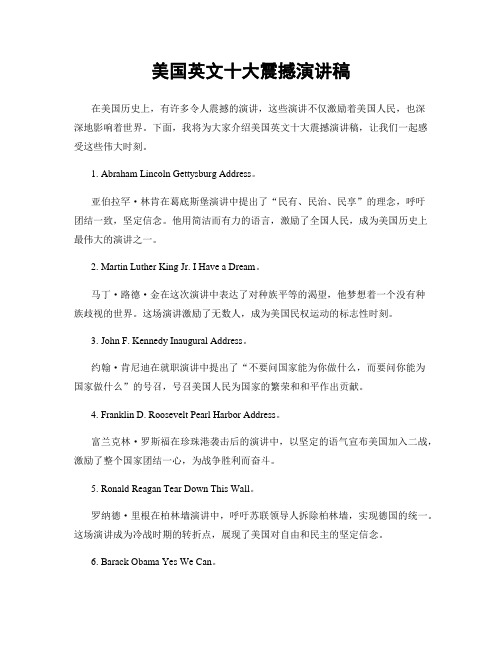
美国英文十大震撼演讲稿在美国历史上,有许多令人震撼的演讲,这些演讲不仅激励着美国人民,也深深地影响着世界。
下面,我将为大家介绍美国英文十大震撼演讲稿,让我们一起感受这些伟大时刻。
1. Abraham Lincoln Gettysburg Address。
亚伯拉罕·林肯在葛底斯堡演讲中提出了“民有、民治、民享”的理念,呼吁团结一致,坚定信念。
他用简洁而有力的语言,激励了全国人民,成为美国历史上最伟大的演讲之一。
2. Martin Luther King Jr. I Have a Dream。
马丁·路德·金在这次演讲中表达了对种族平等的渴望,他梦想着一个没有种族歧视的世界。
这场演讲激励了无数人,成为美国民权运动的标志性时刻。
3. John F. Kennedy Inaugural Address。
约翰·肯尼迪在就职演讲中提出了“不要问国家能为你做什么,而要问你能为国家做什么”的号召,号召美国人民为国家的繁荣和和平作出贡献。
4. Franklin D. Roosevelt Pearl Harbor Address。
富兰克林·罗斯福在珍珠港袭击后的演讲中,以坚定的语气宣布美国加入二战,激励了整个国家团结一心,为战争胜利而奋斗。
5. Ronald Reagan Tear Down This Wall。
罗纳德·里根在柏林墙演讲中,呼吁苏联领导人拆除柏林墙,实现德国的统一。
这场演讲成为冷战时期的转折点,展现了美国对自由和民主的坚定信念。
6. Barack Obama Yes We Can。
巴拉克·奥巴马在总统竞选演讲中,提出了“是的,我们能够”的口号,号召全国人民团结一致,共同创造美好的未来。
7. Winston Churchill We Shall Fight on the Beaches。
温斯顿·丘吉尔在二战期间的演讲中,以坚定的决心宣布英国将与德国进行殊死抗争,激励了整个国家坚定不移地抵抗敌人。
里根演讲稿中英
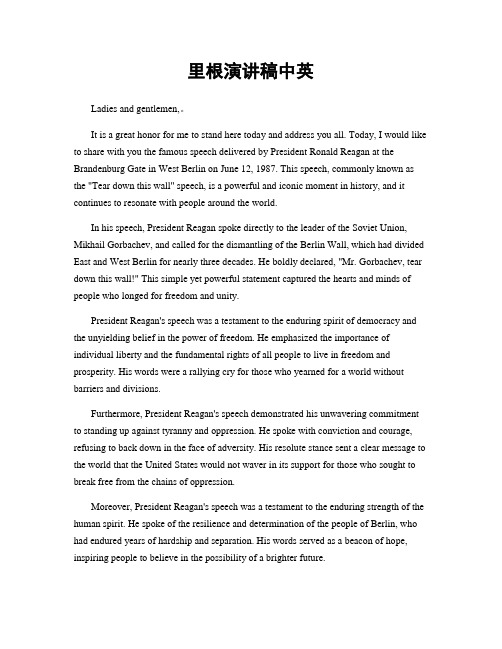
里根演讲稿中英Ladies and gentlemen,。
It is a great honor for me to stand here today and address you all. Today, I would like to share with you the famous speech delivered by President Ronald Reagan at the Brandenburg Gate in West Berlin on June 12, 1987. This speech, commonly known as the "Tear down this wall" speech, is a powerful and iconic moment in history, and it continues to resonate with people around the world.In his speech, President Reagan spoke directly to the leader of the Soviet Union, Mikhail Gorbachev, and called for the dismantling of the Berlin Wall, which had divided East and West Berlin for nearly three decades. He boldly declared, "Mr. Gorbachev, tear down this wall!" This simple yet powerful statement captured the hearts and minds of people who longed for freedom and unity.President Reagan's speech was a testament to the enduring spirit of democracy and the unyielding belief in the power of freedom. He emphasized the importance of individual liberty and the fundamental rights of all people to live in freedom and prosperity. His words were a rallying cry for those who yearned for a world without barriers and divisions.Furthermore, President Reagan's speech demonstrated his unwavering commitment to standing up against tyranny and oppression. He spoke with conviction and courage, refusing to back down in the face of adversity. His resolute stance sent a clear message to the world that the United States would not waver in its support for those who sought to break free from the chains of oppression.Moreover, President Reagan's speech was a testament to the enduring strength of the human spirit. He spoke of the resilience and determination of the people of Berlin, who had endured years of hardship and separation. His words served as a beacon of hope, inspiring people to believe in the possibility of a brighter future.In conclusion, President Ronald Reagan's speech at the Brandenburg Gate remains a powerful symbol of courage, determination, and the unbreakable human spirit. His call to "tear down this wall" continues to inspire people to strive for a world free from division and oppression. Let us remember his words and work together to build a future where freedom and unity prevail.Thank you.。
里根总统复旦演讲稿英语
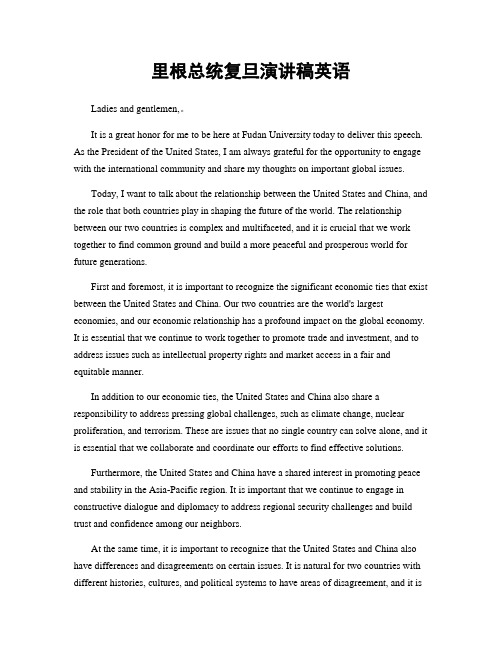
里根总统复旦演讲稿英语Ladies and gentlemen,。
It is a great honor for me to be here at Fudan University today to deliver this speech. As the President of the United States, I am always grateful for the opportunity to engage with the international community and share my thoughts on important global issues.Today, I want to talk about the relationship between the United States and China, and the role that both countries play in shaping the future of the world. The relationship between our two countries is complex and multifaceted, and it is crucial that we work together to find common ground and build a more peaceful and prosperous world for future generations.First and foremost, it is important to recognize the significant economic ties that exist between the United States and China. Our two countries are the world's largest economies, and our economic relationship has a profound impact on the global economy. It is essential that we continue to work together to promote trade and investment, and to address issues such as intellectual property rights and market access in a fair and equitable manner.In addition to our economic ties, the United States and China also share a responsibility to address pressing global challenges, such as climate change, nuclear proliferation, and terrorism. These are issues that no single country can solve alone, and it is essential that we collaborate and coordinate our efforts to find effective solutions.Furthermore, the United States and China have a shared interest in promoting peace and stability in the Asia-Pacific region. It is important that we continue to engage in constructive dialogue and diplomacy to address regional security challenges and build trust and confidence among our neighbors.At the same time, it is important to recognize that the United States and China also have differences and disagreements on certain issues. It is natural for two countries with different histories, cultures, and political systems to have areas of disagreement, and it isimportant that we approach these differences with mutual respect and a willingness to listen to each other's perspectives.In conclusion, the relationship between the United States and China is one of the most important bilateral relationships in the world today. It is essential that we continue to engage in open and constructive dialogue, and work together to address our differences and find common ground on the issues that matter most to our two countries and the world as a whole.Thank you for your attention, and I look forward to continuing the conversation with all of you in the future.。
英语演讲稿-Tear Down This Wall
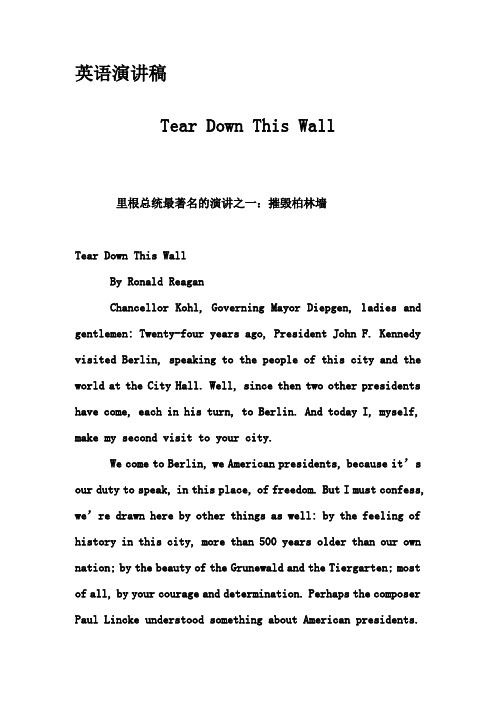
英语演讲稿Tear Down This Wall里根总统最著名的演讲之一:摧毁柏林墙Tear Down This WallBy Ronald ReaganChancellor Kohl, Governing Mayor Diepgen, ladies and gentlemen: Twenty-four years ago, President John F. Kennedy visited Berlin, speaking to the people of this city and the world at the City Hall. Well, since then two other presidents have come, each in his turn, to Berlin. And today I, myself, make my second visit to your city.We come to Berlin, we American presidents, because it’s our duty to speak, in this place, of freedom. But I must confess, we’re drawn here by other things as well: by the feeling of history in this city, more than 500 years older than our own nation; by the beauty of the Grunewald and the Tiergarten; most of all, by your courage and determination. Perhaps the composer Paul Lincke understood something about American presidents.You see, like so many presidents before me, I come here today because wherever I go, whatever I do: Ich hab noch einen Koffer in Berlin.Our gathering today is being broadcast throughout Western Europe and North America. I understand that it is being seen and heard as well in the East. To those listening throughout Eastern Europe, a special word: Although I cannot be with you, I address my remarks to you just as surely as to those standing here before me. For I join you, as I join your fellow countrymen in the West, in this firm, this unalterable belief: Es gibt nur ein Berlin.Behind me stands a wall that encircles the free sectors of this city, part of a vast system of barriers that divides the entire continent of Europe. From the Baltic, south, those barriers cut across Germany in a gash of barbed wire, concrete, dog runs, and guard towers. Farther south, there may be no visible, no obvious wall. But there remain armed guards and checkpoints all the same — still a restriction on the right to travel, still an instrument to impose upon ordinary men and women the will of a totalitarian state. Yet it is here in Berlin where the wall emerges most clearly; here, cutting across your city, where the news photo and the television screen haveimprinted this brutal division of a continent upon the mind of the world. Standing before the Brandenburg Gate, every man is a German, separated from his fellow men. Every man is a Berliner, forced to look upon a scar.President von Weizsacker has said, “The German question is open as long as the Brandenburg Gate is closed.” Today I say: As long as the gate is closed, as long as this scar of a wall is permitted to stand, it is not the German question alone that remains open, but the question of freedom for all mankind. Yet I do not come here to lament. For I find in Berlin a message of hope, even in the shadow of this wall, a message of triumph.In this season of spring in 1945, the people of Berlin emerged from their air-raid shelters to find devastation. Thousands of miles away, the people of the United States reached out to help. And in 1947 Secretary of State — as you’ve been told — George Marshall announced the creation of what would become known as the Marshall Plan. Speaking precisely 40 years ago this month, he said: “Our policy is directed not against any country or doctrine, but against hunger, poverty, desperation, and chaos.”In the Reichstag a few moments ago, I saw a displaycommemorating this 40th anniversary of the Marshall Plan. I was struck by the sign on a burnt-out, gutted structure that was being rebuilt. I understand that Berliners of my own generation can remember seeing signs like it dotted throughout the western sectors of the city. The sign read simply: “The Marshall Plan is helping here to strengthen the free world.”A strong, free world in the West, that dream became real.Japan rose from ruin to become an economic giant. Italy, France, Belgium — virtually every nation in Western Europe saw political and economic rebirth; the European Community was founded.In West Germany and here in Berlin, there took place an economic miracle, the Wirtschaftswunder. Adenauer, Erhard, Reuter, and other leaders understood the practical importance of liberty — that just as truth can flourish only when the journalist is given freedom of speech, so prosperity can come about only when the farmer and businessman enjoy economic freedom. The German leaders reduced tariffs, expanded free trade, lowered taxes. From 1950 to 1960 alone, the standard of living in West Germany and Berlin doubled.Where four decades ago there was rubble, today in West Berlin there is the greatest industrial output of any city inGermany — busy office blocks, fine homes and apartments, proud avenues, and the spreading lawns of parkland. Where a city’s culture seemed to have been destroyed, today there are two great universities, orchestras and an opera, countless theaters, and museums. Where there was want, today there’s abundance — food, clothing, automobiles — the wonderful goods of the Ku’damm. From devastation, from utter ruin, you Berliners have, in freedom, rebuilt a city that once again ranks as one of the greatest on earth. The Soviets may have had other plans. But my friends, there were a few things the Soviets didn’t count on — Berliner Herz, Berliner Humor, ja, und Berliner Schnauze.In the 1950s, Khrushchev predicted: “We will bury you.”But in the West today, we see a free world that has achieved a level of prosperity and well-being unprecedented in all human history. In the Communist world, we see failure, technological backwardness, declining standards of health, even want of the most basic kind — too little food. Even today, the Soviet Union still cannot feed itself. After these four decades, then, there stands before the entire world one great and inescapable conclusion: Freedom leads to prosperity. Freedom replaces the ancient hatreds among the nations with comity and peace.Freedom is the victor.And now the Soviets themselves may, in a limited way, be coming to understand the importance of freedom. We hear much from Moscow about a new policy of reform and openness. Some political prisoners have been released. Certain foreign news broadcasts are no longer being jammed. Some economic enterprises have been permitted to operate with greater freedom from state control.Are these the beginnings of profound changes in the Soviet state? Or are they token gestures, intended to raise false hopes in the West, or to strengthen the Soviet system without changing it? We welcome change and openness; for we believe that freedom and security go together, that the advance of human liberty can only strengthen the cause of world peace. There is one sign the Soviets can make that would be unmistakable, that would advance dramatically the cause of freedom and peace.General Secretary Gorbachev, if you seek peace, if you seek prosperity for the Soviet Union and Eastern Europe, if you seek liberalization: Come here to this gate! Mr. Gorbachev, open this gate! Mr. Gorbachev, tear down this wall!I understand the fear of war and the pain of divisionthat afflict this continent —and I pledge to you my country’s efforts to help overcome these burdens. To be sure, we in the West must resist Soviet expansion. So we must maintain defenses of unassailable strength. Yet we seek peace; so we must strive to reduce arms on both sides.Beginning 10 years ago, the Soviets challenged the Western alliance with a grave new threat, hundreds of new and more deadly SS-20 nuclear missiles, capable of striking every capital in Europe. The Western alliance responded by committing itself to a counter-deployment unless the Soviets agreed to negotiate a better solution; namely, the elimination of such weapons on both sides. For many months, the Soviets refused to bargain in earnestness. As the alliance, in turn, prepared to go forward with its counter-deployment, there were difficult days — days of protests like those during my 1982 visit to this city — and the Soviets later walked away from the table.But through it all, the alliance held firm. And I invite those who protested then —I invite those who protest today — to mark this fact: Because we remained strong, the Soviets came back to the table. And because we remained strong, today we have within reach the possibility, not merely of limitingthe growth of arms, but of eliminating, for the first time, an entire class of nuclear weapons from the face of the earth.As I speak, NATO ministers are meeting in Iceland to review the progress of our proposals for eliminating these weapons. At the talks in Geneva, we have also proposed deep cuts in strategic offensive weapons. And the Western allies have likewise made far-reaching proposals to reduce the danger of conventional war and to place a total ban on chemical weapons.While we pursue these arms reductions, I pledge to you that we will maintain the capacity to deter Soviet aggression at any level at which it might occur.And in cooperation with many of our allies, the United States is pursuing the Strategic Defense Initiative —research to base deterrence not on the threat of offensive retaliation, but on defenses that truly defend; on systems, in short, that will not target populations, but shield them. By these means we seek to increase the safety of Europe and all the world. But we must remember a crucial fact: East and West do not mistrust each other because we are armed; we are armed because we mistrust each other. And our differences are not about weapons but about liberty. When President Kennedyspoke at the City Hall those 24 years ago, freedom was encircled, Berlin was under siege. And today, despite all the pressures upon this city, Berlin stands secure in its liberty. And freedom itself is transforming the globe.In the Philippines, in South and Central America, democracy has been given a rebirth. Throughout the Pacific, free markets are working miracle after miracle of economic growth. In the industrialized nations, a technological revolution is taking place — a revolution marked by rapid, dramatic advances in computers and telecommunications.In Europe, only one nation and those it controls refuse to join the community of freedom. Yet in this age of redoubled economic growth, of information and innovation, the Soviet Union faces a choice: It must make fundamental changes, or it will become obsolete.Today thus represents a moment of hope. We in the West stand ready to cooperate with the East to promote true openness, to break down barriers that separate people, to create a safe, freer world. And surely there is no better place than Berlin, the meeting place of East and West, to make a start. Free people of Berlin: Today, as in the past, the United States stands for the strict observance and full implementation of all parts ofthe Four Power Agreement of 1971.Let us use this occasion, the 750th anniversary of this city, to usher in a new era, to seek a still fuller, richer life for the Berlin of the future.Together, let us maintain and develop the ties between the Federal Republic and the Western sectors of Berlin, which is permitted by the 1971 agreement.And I invite Mr. Gorbachev: Let us work to bring the Eastern and Western parts of the city closer together, so that all the inhabitants of all Berlin can enjoy the benefits that come with life in one of the great cities of the world.To open Berlin still further to all Europe, East and West, let us expand the vital air access to this city, finding ways of making commercial air service to Berlin more convenient, more comfortable, and more economical. We look to the day when West Berlin can become one of the chief aviation hubs in all central Europe.With our French and British partners, the United States is prepared to help bring international meetings to Berlin. It would be only fitting for Berlin to serve as the site of United Nations meetings, or world conferences on human rights and arms control or other issues that call for internationalcooperation.There is no better way to establish hope for the future than to enlighten young minds, and we would be honored to sponsor summer youth exchanges, cultural events, and other programs for young Berliners from the East. Our French and British friends, I’m certain, will do the same. And it’s my hope that an authority can be found in East Berlin to sponsor visits from young people of the Western sectors.One final proposal, one close to my heart: Sport represents a source of enjoyment and ennoblement, and you may have noted that the Republic of Korea — South Korea — has offered to permit certain events of the 1988 Olympics to take place in the North. International sports competitions of all kinds could take place in both parts of this city. And what better way to demonstrate to the world the openness of this city than to offer in some future year to hold the Olympic games here in Berlin, East and West? In these four decades, as I have said, you Berliners have built a great city. You’ve done so in spite of threats —the Soviet attempts to impose the East-mark, the blockade. Today the city thrives in spite of the challenges implicit in the very presence of this wall.What keeps you here? Certainly there’s a great deal tobe said for your fortitude, for your defiant courage. But I believe there’s something deeper, something that involves Berlin’s whole look and feel and way of life — not mere sentiment. No one could live long in Berlin without being completely disabused of illusions. Something instead, that has seen the difficulties of life in Berlin but chose to accept them, that continues to build this good and proud city in contrast to a surrounding totalitarian presence that refuses to release human energies or aspirations. Something that speaks with a powerful voice of affirmation, that says yes to this city, yes to the future, yes to freedom. In a word, I would submit that what keeps you in Berlin is love — love both profound and abiding.Perhaps this gets to the root of the matter, to the most fundamental distinction of all between East and West. The totalitarian world produces backwardness because it does such violence to the spirit, thwarting the human impulse to create, to enjoy, to worship. The totalitarian world finds even symbols of love and of worship an affront. Years ago, before the East Germans began rebuilding their churches, they erected a secular structure: the television tower at Alexander Platz. Virtually ever since, the authorities have been working tocorrect what they view as the tower’s one major flaw, treatingthe glass sphere at the top with paints and chemicals of everykind. Yet even today when the sun strikes that sphere — thatsphere that towers over all Berlin — the light makes the signof the cross. There in Berlin, like the city itself, symbolsof love, symbols of worship, cannot be suppressed.As I looked out a moment ago from the Reichstag, that embodiment of German unity, I noticed words crudelyspray-painted upon the wall, perhaps by a young Berliner:“This wall will fall. Beliefs become reality.” Yes, acrossEurope, this wall will fall. For it cannot withstand faith;it cannot withstand truth.The wall cannot withstand freedom.And I would like, before I close, to say one word. I haveread, and I have been questioned since I’ve been here aboutcertain demonstrations against my coming. And I would like tosay just one thing, and to those who demonstrate so. I wonderif they have ever asked themselves that if they should havethe kind of government they apparently seek, no one would everbe able to do what they’re doing again.Thank you and God bless you all.。
里根总统演讲中英文
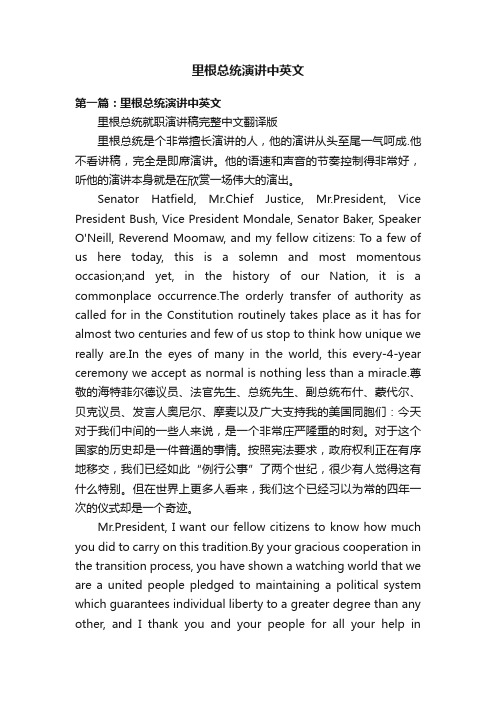
里根总统演讲中英文第一篇:里根总统演讲中英文里根总统就职演讲稿完整中文翻译版里根总统是个非常擅长演讲的人,他的演讲从头至尾一气呵成.他不看讲稿,完全是即席演讲。
他的语速和声音的节奏控制得非常好,听他的演讲本身就是在欣赏一场伟大的演出。
Senator Hatfield, Mr.Chief Justice, Mr.President, Vice President Bush, Vice President Mondale, Senator Baker, Speaker O'Neill, Reverend Moomaw, and my fellow citizens: To a few of us here today, this is a solemn and most momentous occasion;and yet, in the history of our Nation, it is a commonplace occurrence.The orderly transfer of authority as called for in the Constitution routinely takes place as it has for almost two centuries and few of us stop to think how unique we really are.In the eyes of many in the world, this every-4-year ceremony we accept as normal is nothing less than a miracle.尊敬的海特菲尔德议员、法官先生、总统先生、副总统布什、蒙代尔、贝克议员、发言人奥尼尔、摩麦以及广大支持我的美国同胞们:今天对于我们中间的一些人来说,是一个非常庄严隆重的时刻。
对于这个国家的历史却是一件普通的事情。
纪念柏林墙倒塌(英语版)
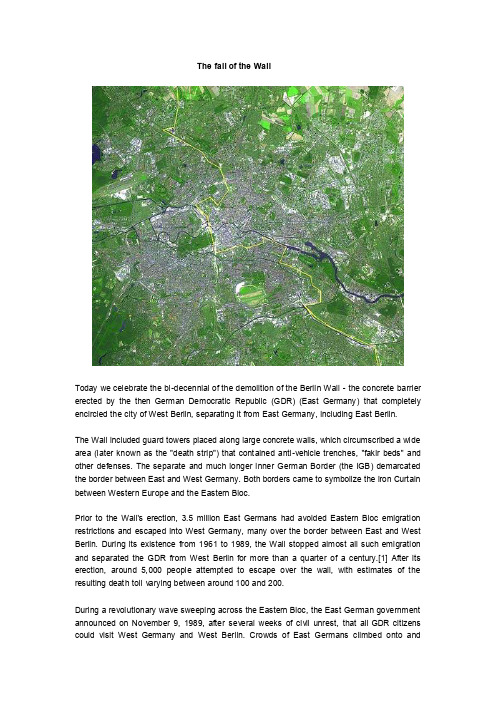
The fall of the WallToday we celebrate the bi-decennial of the demolition of the Berlin Wall - the concrete barrier erected by the then German Democratic Republic (GDR) (East Germany) that completely encircled the city of West Berlin, separating it from East Germany, including East Berlin.The Wall included guard towers placed along large concrete walls, which circumscribed a wide area (later known as the "death strip") that contained anti-vehicle trenches, "fakir beds" and other defenses. The separate and much longer inner German Border (the IGB) demarcated the border between East and West Germany. Both borders came to symbolize the Iron Curtain between Western Europe and the Eastern Bloc.Prior to the Wall's erection, 3.5 million East Germans had avoided Eastern Bloc emigration restrictions and escaped into West Germany, many over the border between East and West Berlin. During its existence from 1961 to 1989, the Wall stopped almost all such emigration and separated the GDR from West Berlin for more than a quarter of a century.[1] After its erection, around 5,000 people attempted to escape over the wall, with estimates of the resulting death toll varying between around 100 and 200.During a revolutionary wave sweeping across the Eastern Bloc, the East German government announced on November 9, 1989, after several weeks of civil unrest, that all GDR citizens could visit West Germany and West Berlin. Crowds of East Germans climbed onto andcrossed the wall, joined by West Germans on the other side in a celebratory atmosphere. Over the next few weeks, parts of the wall were chipped away by a euphoric public and by souvenir hunters; industrial equipment was later used to remove almost all of the rest. The fall of the Berlin Wall paved the way for German reunification, which was formally concluded on October 3, 1990.。
林肯格里斯堡演讲(中英)
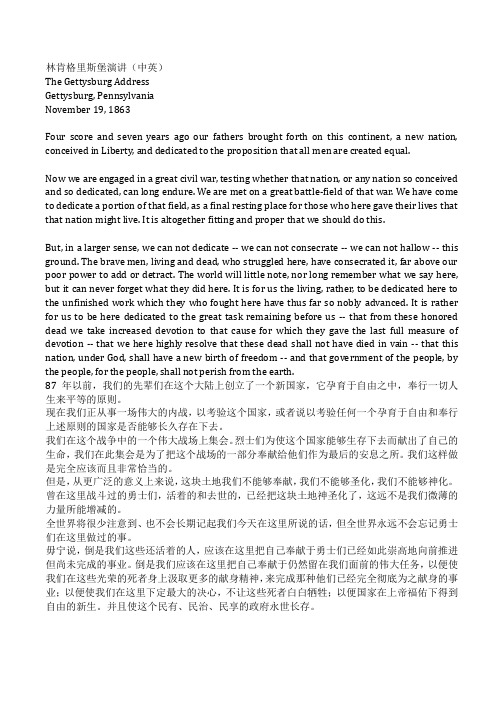
林肯格里斯堡演讲(中英)The Gettysburg AddressGettysburg, PennsylvaniaNovember 19, 1863Four score and seven years ago our fathers brought forth on this continent, a new nation, conceived in Liberty, and dedicated to the proposition that all men are created equal.Now we are engaged in a great civil war, testing whether that nation, or any nation so conceived and so dedicated, can long endure. We are met on a great battle-field of that war. We have come to dedicate a portion of that field, as a final resting place for those who here gave their lives that that nation might live. It is altogether fitting and proper that we should do this.But, in a larger sense, we can not dedicate -- we can not consecrate -- we can not hallow -- this ground. The brave men, living and dead, who struggled here, have consecrated it, far above our poor power to add or detract. The world will little note, nor long remember what we say here, but it can never forget what they did here. It is for us the living, rather, to be dedicated here to the unfinished work which they who fought here have thus far so nobly advanced. It is rather for us to be here dedicated to the great task remaining before us -- that from these honored dead we take increased devotion to that cause for which they gave the last full measure of devotion -- that we here highly resolve that these dead shall not have died in vain -- that this nation, under God, shall have a new birth of freedom -- and that government of the people, by the people, for the people, shall not perish from the earth.87年以前,我们的先辈们在这个大陆上创立了一个新国家,它孕育于自由之中,奉行一切人生来平等的原则。
在柏林墙边的演说 Ich bin ein Berliner I am a 'Berliner‘_1
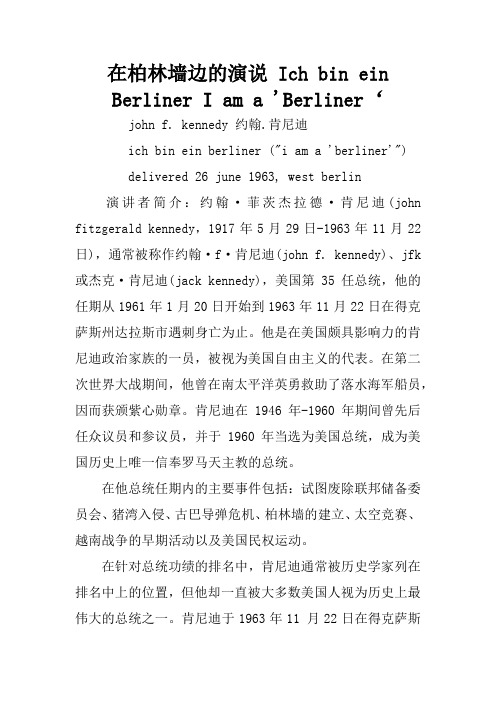
在柏林墙边的演说 Ich bin einBerliner I am a 'Berliner‘john f. kennedy 约翰.肯尼迪ich bin ein berliner ("i am a 'berliner'")delivered 26 june 1963, west berlin演讲者简介:约翰·菲茨杰拉德·肯尼迪(john fitzgerald kennedy,1917年5月29日-1963年11月22日),通常被称作约翰·f·肯尼迪(john f. kennedy)、jfk 或杰克·肯尼迪(jack kennedy),美国第35任总统,他的任期从1961年1月20日开始到1963年11月22日在得克萨斯州达拉斯市遇刺身亡为止。
他是在美国颇具影响力的肯尼迪政治家族的一员,被视为美国自由主义的代表。
在第二次世界大战期间,他曾在南太平洋英勇救助了落水海军船员,因而获颁紫心勋章。
肯尼迪在 1946年-1960年期间曾先后任众议员和参议员,并于1960年当选为美国总统,成为美国历史上唯一信奉罗马天主教的总统。
在他总统任期内的主要事件包括:试图废除联邦储备委员会、猪湾入侵、古巴导弹危机、柏林墙的建立、太空竞赛、越南战争的早期活动以及美国民权运动。
在针对总统功绩的排名中,肯尼迪通常被历史学家列在排名中上的位置,但他却一直被大多数美国人视为历史上最伟大的总统之一。
肯尼迪于1963年11 月22日在得克萨斯州达拉斯市遇刺身亡,官方在随后的调查报告中公布的结果表明,李·哈维·奥斯瓦尔德是刺杀总统的凶手。
他的遇刺被视为对美国历史的发展产生重大决定性影响的事件之一,因为这一事件在其后数十年中一直影响了美国政治的发展方向。
演讲背景介绍:1961年8月12─l 3日夜间,东德政府筑起柏林墙把东西柏林分开。
希特勒演讲稿中英互译_希特勒最著名的演讲
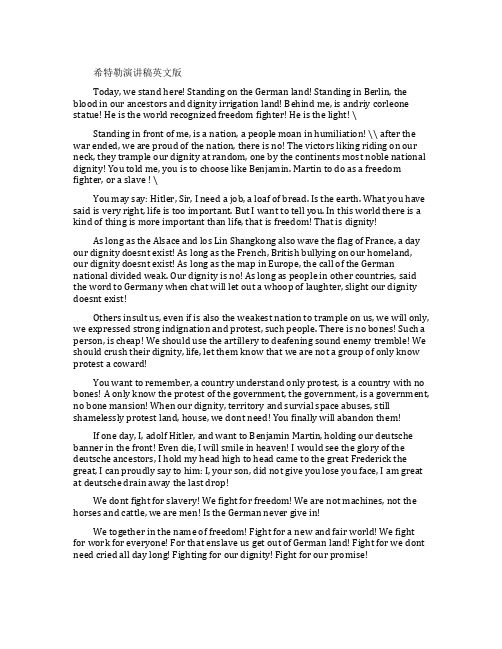
希特勒演讲稿英文版Today, we stand here! Standing on the German land! Standing in Berlin, the blood in our ancestors and dignity irrigation land! Behind me, is andriy corleone statue! He is the world recognized freedom fighter! He is the light! \Standing in front of me, is a nation, a people moan in humiliation! \\ after the war ended, we are proud of the nation, there is no! The victors liking riding on our neck, they trample our dignity at random, one by the continents most noble national dignity! You told me, you is to choose like Benjamin. Martin to do as a freedom fighter, or a slave ! \You may say: Hitler, Sir, I need a job, a loaf of bread. Is the earth. What you have said is very right, life is too important. But I want to tell you. In this world there is a kind of thing is more important than life, that is freedom! That is dignity!As long as the Alsace and los Lin Shangkong also wave the flag of France, a day our dignity doesnt exist! As long as the French, British bullying on our homeland, our dignity doesnt exist! As long as the map in Europe, the call of the German national divided weak. Our dignity is no! As long as people in other countries, said the word to Germany when chat will let out a whoop of laughter, slight our dignity doesnt exist!Others insult us, even if is also the weakest nation to trample on us, we will only, we expressed strong indignation and protest, such people. There is no bones! Such a person, is cheap! We should use the artillery to deafening sound enemy tremble! We should crush their dignity, life, let them know that we are not a group of only know protest a coward!You want to remember, a country understand only protest, is a country with no bones! A only know the protest of the government, the government, is a government, no bone mansion! When our dignity, territory and survial space abuses, still shamelessly protest land, house, we dont need! You finally will abandon them!If one day, I, adolf Hitler, and want to Benjamin Martin, holding our deutsche banner in the front! Even die, I will smile in heaven! I would see the glory of the deutsche ancestors, I hold my head high to head came to the great Frederick the great, I can proudly say to him: I, your son, did not give you lose you face, I am great at deutsche drain away the last drop!We dont fight for slavery! We fight for freedom! We are not machines, not the horses and cattle, we are men! Is the German never give in!We together in the name of freedom! Fight for a new and fair world! We fight for work for everyone! For that enslave us get out of German land! Fight for we dont need cried all day long! Fighting for our dignity! Fight for our promise!Fight for the liberation of the country! Germans, we fight for the glory of our ancestors! For our children and grandchildren can proudly: we are never succumb fighting German!\My fellow citizens, Germany and the German people, live forever! Free, live forever!希特勒演讲稿中文版今天,我们站在这里!站在德国人的土地上!站在柏林,这块我们祖先用鲜血和尊严浇灌的土地上!我的身后,是安德烈.柯里昂的雕像!他是全世界公认的自由斗士!他是全世界的光!我的面前,站着的是一个民族,一个在屈辱中呻吟的民族!那场战争结束之后,我们这个民族的骄傲就没有了!那些战胜者们骑在我们的脖子上作威作福,他们随意践踏我们的尊严,一个欧洲大陆上最高贵的民族地尊严!你们告诉我,你们是选择像本杰明.马丁一样去做一个自由的斗士,还是一个奴隶!你们或许要说:希特勒先生,我需要一个,一块面包。
- 1、下载文档前请自行甄别文档内容的完整性,平台不提供额外的编辑、内容补充、找答案等附加服务。
- 2、"仅部分预览"的文档,不可在线预览部分如存在完整性等问题,可反馈申请退款(可完整预览的文档不适用该条件!)。
- 3、如文档侵犯您的权益,请联系客服反馈,我们会尽快为您处理(人工客服工作时间:9:00-18:30)。
篇一:追忆柏林墙追忆柏林墙肯尼迪在柏林墙边的演说:kennedy二千年以前,最自豪的夸耀是civitas romanus sum,今天,自由世界最自豪的夸耀是ich bin ein berliner。
世界上有许多人确实不懂,或者说他们不明白什么是自由世界和共产主义世界的根本分歧。
让他们来柏林吧。
有些人说,共产主义是未来的潮流。
让他们来柏林吧。
有些人说,我们能在欧洲或其他地方与共产党人合作。
让他们来柏林吧。
甚至有那么几个人说,共产主义确是一种邪恶的制度,但它可以使我们取得经济发展。
“lasst sie nach berlin kommen.”自由有许多困难,民主亦非完美,然而我们从未建造一堵墙把我们的人民关在里面,不准他们离开我们。
我愿意我的同胞们——他们与你们远隔千里住在大西洋彼岸——说,他们为能在远方与你们共有过去十八年的经历感到莫大的骄傲。
我不知道还有哪一个城镇或都市被围困十八年仍葆有西柏林的这种生机、力量、希望和决心。
全世界都看到,柏林墙最生动最明显地表现出一种失败。
但我们对此并不感到称心如意,因为柏林墙既是对历史也是对人性的冒犯,它拆散家庭,造成妻离子散骨肉分离,把希冀统一的一个民族分成两半。
这个城市的事实也用于整个德国——只要四个德国人中有一个被剥夺了自由人的基本权利,即自由选择的权利,那么欧洲真正持久的和平便绝无可能实现。
经过保持和平与善意的十八年,这一代德国人终于赢得自由的权利,包括在持久和平中善所有的人民,实现家庭团聚和民族统一的权利。
你们住在受到保护的一座自由之岛上,但你们的生活是大海的一部分。
因此让我在结束讲话时请求你们抬起目光,超越今日的危险看到明天的希望;超越这道墙看到正义的生平来临的一天;超越你们自己和我们自己看到全人类。
自由是不可分割的,只要一人被奴役,所有的人都不自由。
当所有的人都自由了,那时我们便能期待这一天的到来:在和平与希望的光辉中这座城市获得统一,这个国家获得统一,欧洲大陆获得统一。
当这一天最终来临——它必将来临——时,西柏林人民将能对这一点感到欣慰:几乎二十年时间里他们站在第一线。
一切自由人,不论他们住在何方,皆是柏林市民,所以作为一个自由人,我为“ich bin ein berliner”这句话感到自豪。
历史见证:越过柏林墙,寻求自由柏林墙由12公里长的水泥墙和137公里长的铁丝网组成,包括有116个观望台,随后经过了四次改建和加固。
柏林墙一共截断了192条街道(97条在柏林内,95条为柏林通向东德的道路),32条铁路线,8条轻轨和4条地铁以及3条高速公路。
边界上的河流、湖泊也被禁止通航,并加以监视。
西柏林变成了一座孤岛。
谁想在西柏林与西德之间旅行,则必须通过边境的严格检查。
第二次世界大战结束后,德国被分为4个区域,分别由法国、英国、美国和苏联接管,后来前三方合并,而苏联接管的地区变得更加孤立。
这条1953年拉起的钢丝围栏把很多德国朋友分开了。
随着苏联和西方国家紧张局势的加剧,不同地区间的通道逐渐缩小。
1961年,这条边界被正式化地变成了一堵砖墙,照片中东德士兵和工人正在给柏林墙增加高度。
柏林墙把千千万万的德国家庭分隔开来,许多居住在东部的德国人无法再去西部上班。
沿墙而行的街道也都被割裂开来,许多交通工具无法再在那里行驶。
多年来很多东德人试图逃到西边去。
图为1961年一名17岁的东德男孩翻越柏林墙,两名西德警察正在帮助他安全地下来。
柏林墙建成后,西柏林变成了一片孤独的、被敌视和被包围的土地。
在柏林墙位于奥巴鲍姆桥的检查站,两名东德边界警卫锁好大门后离开。
美国总统肯尼迪于1963年访问柏林墙位于勃兰登堡门的关口,他在发表演讲时用德语说:我是一个柏林人(ich bin ein berliner)。
这句话后来成为名言。
逃到西德的东德女孩在和妈妈隔墙说话。
到上世纪80年代中期,柏林墙已经成为冷战的最持久象征。
“自由有许多困难,民主亦非完美,然而我们从未建造一堵墙把我们的人民关在里面,不准他们离开我们。
”——肯尼迪《柏林墙下的演说》1963年6月25日于西德市政厅柏林墙前。
柏林墙地面逃亡最简单的方式是直接翻墙而过。
看上去一人多高的墙可以翻身而上。
但逃亡者从开始在边境开阔地带奔跑到墙下,再翻身跃上墙的这段时间内,生与死就完全听天由命了。
1961年,当十八岁的东柏林青年彼得·费希特尔在到达墙跟翻身跃墙,他已经爬到了柏林墙的顶部,只需要再加最后一把劲,就可以达成目标,就在这个时候,枪声响了??彼得滑落回柏林墙东侧。
悲剧还没有完,身中数弹的彼得倒在柏林墙下,血流如注,这期间,他不停地呼喊救命,呼声惊动了西柏林一边的边防军人。
军人们扔过来一个急救包,但血将流尽的彼得·费希特尔已无力自救。
彼得就这样在墙下躺了50分钟,没有一个东德警察前来管他。
彼得的呼喊声一点一点的低下去了,低下去了。
西柏林的人群爆发出愤怒的抗议声。
这是柏林墙将柏林城和它的人民分割以来,第一位在逃亡中死于枪击的东柏林市民。
如果说彼得最大的不幸在于他最终没有成功,我不知道下面这个最后“成功”的例子,是不是算幸运。
在柏林墙刚完成的那一年,由于墙还不是很坚固,有人就想出了办法,开重型车辆直接撞墙,直接冲开柏林墙进入西德。
1961年,这类事件多达14起。
逃亡者要面对的绝不仅仅是坚固的高墙,还有来自军队和警察的密集射击。
而在枪林弹雨中全速前进去撞一堵大墙的行为,毫无疑问是“双重自杀行为”。
而这却是当年东德一些逃亡者们投生的方式。
布鲁希克和他的同伙就是利用大客车冲击柏林墙,但是他们的行动从一开始就被发现了。
军队和警察从多个方向向客车密集射击,客车起火燃烧,弹痕累累!还好,客车质量过硬,不但没有熄火,还在布鲁希克良好的驾驶下奋勇加速,一声巨响,柏林墙被撞开了一个大缺口,整个客车冲进了西柏林!欢呼的人群拥上来迎接,却被眼前的景象震惊了,驾驶座上的布鲁希克身中19弹,他是用生命的最后意志坚持加速,冲向柏林墙的。
当客车冲进西柏林的那一刻,布鲁希克停止了呼吸。
柏林人展开了一场争论,布鲁希克究竟有没有看到他梦想看到的西柏林?最后是一个现场镜头宽慰了大家,从镜头上看,客车驾驶座位于西柏林之后,布鲁希克还有一个抬头的动作。
是的,那时候他还活着!他的眼睛最后映出的,是他梦想中的自由世界-西柏林!他是一个成功者。
另一个传奇式的故事是空中热气球逃亡。
1979年的一个深夜,东德黑色夜幕的上空出现了一个高度为28米的欧洲历史上最大体积的热气球。
当这个热气球接近柏林墙地域时,被东柏林地面警卫发现。
三束探照灯直射黑色天幕,追踪监视着这个看来企图越境朝西柏林飘去的热气球。
就在地面警卫朝这来历不明的巨大热气球开枪射击之前,热气球迅速高升,爬上了两千六百米高空,随后不知去向。
这个热气球的吊蓝里,装着两个东德的家庭,大人小孩一共八口人。
他们在快速升高后,可能由于慌乱,失去了方向。
当在空中飞行28分钟后,热气球安全降落地面。
悄悄掀开覆盖了他们的巨大气球布,看看外围环境:丛林荒草,远近没有人烟。
他们无法判断究竟是到了自己的目的地西德,还是不过在空中转了一个圈,仍在东德境内。
或者,已经非法进入了其他国家的土地。
他们不知该如何是好。
他们既非科学家又非运动员,虽然对气体动力学一无所知,但自从萌生了用热气球逃出东德的想法,就开始白手起家。
买来了有关的书籍,从头学习有关原理。
买来大量的纺织品,利用自己研制的相关设备一次次实验将要充当气球外体的布的质量。
气象学要掌握、操作要掌握,材料学、工程学、物理、化学、力学等等知识都需要。
后来,那个奇迹终于悄悄地在这一对普通东德人家的房顶下诞生了。
在那个神不知,鬼不觉的深夜,那个欧洲最大的热气球载着两家人的希望和梦想,升上了东德阴霾的天空。
他们什么都想到了:出境前被打落坠地、被逮捕入狱,出境后落入海中或落在人家房顶,落在城市中心等等,无论什么意外事故发生,好歹总要面对一个结局。
他们就是没想到,什么意外也没发生,但当气球安全着陆时,竟是真相不明,无人理睬,没有下文。
两对年轻的父母,带着四个年幼的孩子,闷在气球巨大的布面下,把未来的结局想设想了一遍又一遍:走出这泄了气的热气球,要么被东德政府关进监狱,要么向其他什么国家的政府投案自首,要么在西德安居乐业,重获新生。
想想为这次逃亡而长久地呕心沥血,看看四个无辜的孩子,他们无法承受被东德政府关进监狱的命运,不敢走出气球;或者他们干脆把命运交给了上帝,听天由命。
他们唯一能作的,就是祈祷。
降落整整24小时以后,军人来了,揭开了气球。
他们对这8个逃亡者说出了他们盼望了多少年的话。
“你们自由了!这里是西德的领土”。
1987年6月12日清晨,美国总统里根抵达柏林,此时这座城市正在庆贺其750岁诞辰。
在将东西柏林割裂20余年的分界线——勃兰登堡门的柏林墙前,里根发表了著名的演讲。
演讲稿由秘书起草,听者主要是正意欲与美国缔结友好关系的对象——苏联领导人米哈伊尔·戈尔巴乔夫,还有届时在场的2万名听众。
在这次著名的演讲中,里根呼吁戈尔巴乔夫拆掉柏林墙,这一言辞遭到美国国务院和国家安全委员会的强烈反对,他们担心克里姆林宫的强硬派会以此向戈氏提出质疑。
那天下午,不到2时,里根走上讲台。
因为担心会有恐怖袭击,里根身后放置了两块巨大的防弹玻璃。
里根总统说出了以下这段震撼世界的话:“戈尔巴乔夫总书记,如果你要寻求和平,如果你要为苏联和东欧寻求繁荣,如果你要寻求自由:就到这扇门来吧!戈尔巴乔夫先生,打开这扇门!戈尔巴乔夫先生,拆掉这堵墙!”1987年6月,美国总统里根访问柏林,从德国国会大厦的阳台上观看柏林墙。
篇二:柏林墙柏林墙柏林墙(德语:berliner mauer)是德国分裂期间东德政府环绕西柏林边境修筑的边防系统,以将其与东德领土分割开来。
柏林墙始建于1961年8月13日,全长155公里。
最初以铁丝网和砖石为材料,后期加固为由瞭望塔、混凝土墙、开放地带以及反车辆壕沟组成的边防设施。
东德政府称此墙为“反法西斯防卫墙”(德语:antifaschistischer schutzwall)或“强化边境”(德语:befestigte staatsgrenze),其目的是阻止东德居民逃往西柏林。
第二次世界大战后,原德国首都柏林被分割为东柏林与西柏林,柏林墙的建立是冷战期间美国和苏联两大阵营之间冲突导致的,它是二战后德国分裂和冷战的重要标志性建筑,也成为了分割东西欧的铁幕的一个象征。
柏林墙修筑前,约有250万东德居民逃离东德,他们中的许多人通过西柏林前往西德和其他西欧国家。
柏林墙修建后在1961至1989年间这类逃亡被大幅限制下来,约有5000人在此期间尝试翻越柏林墙。
1960年起东德边防军将其视为非法越境并向越境者开枪射击,1982年《开枪射击令》(schie?befehl)下达后被合法化。
